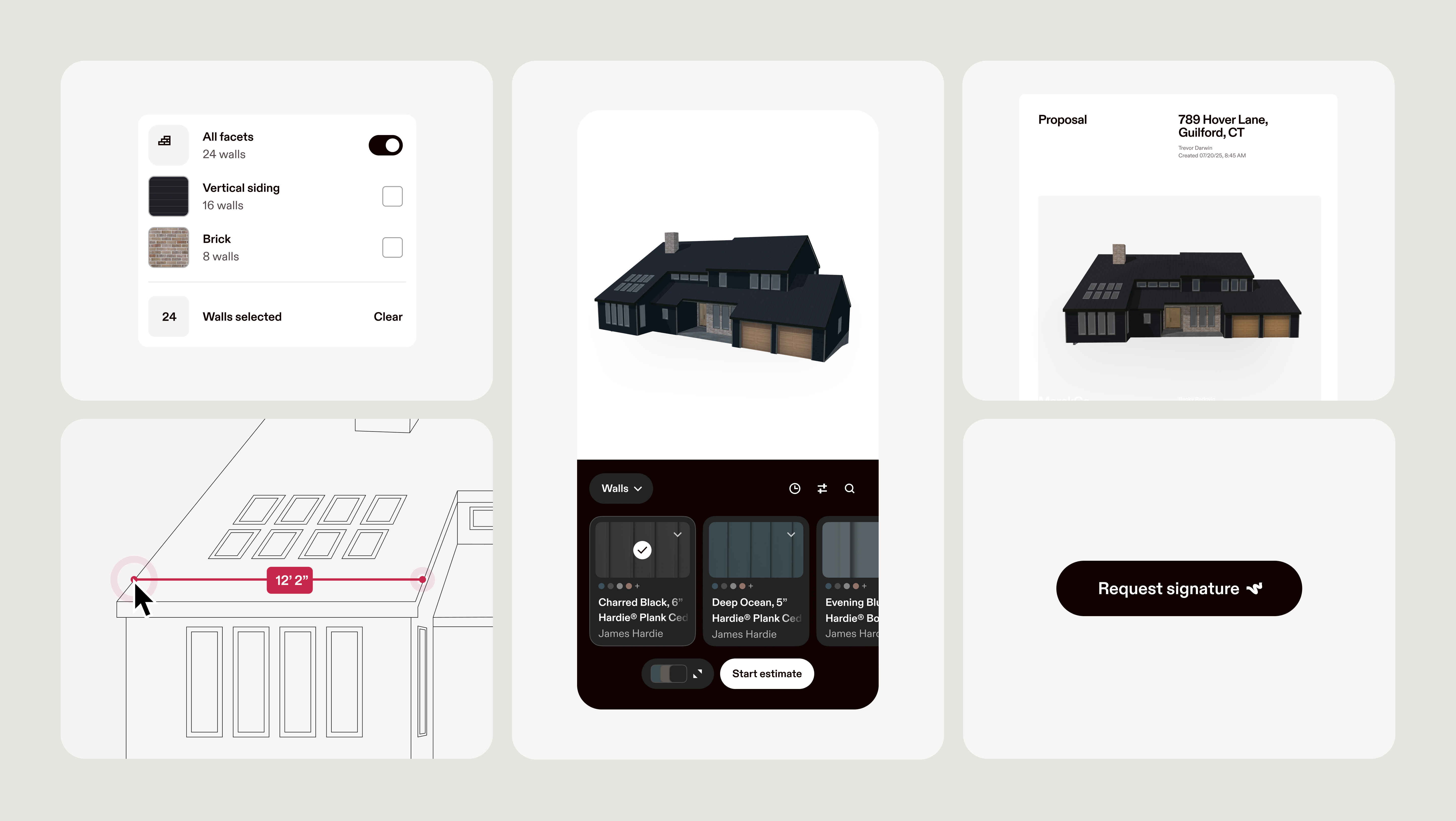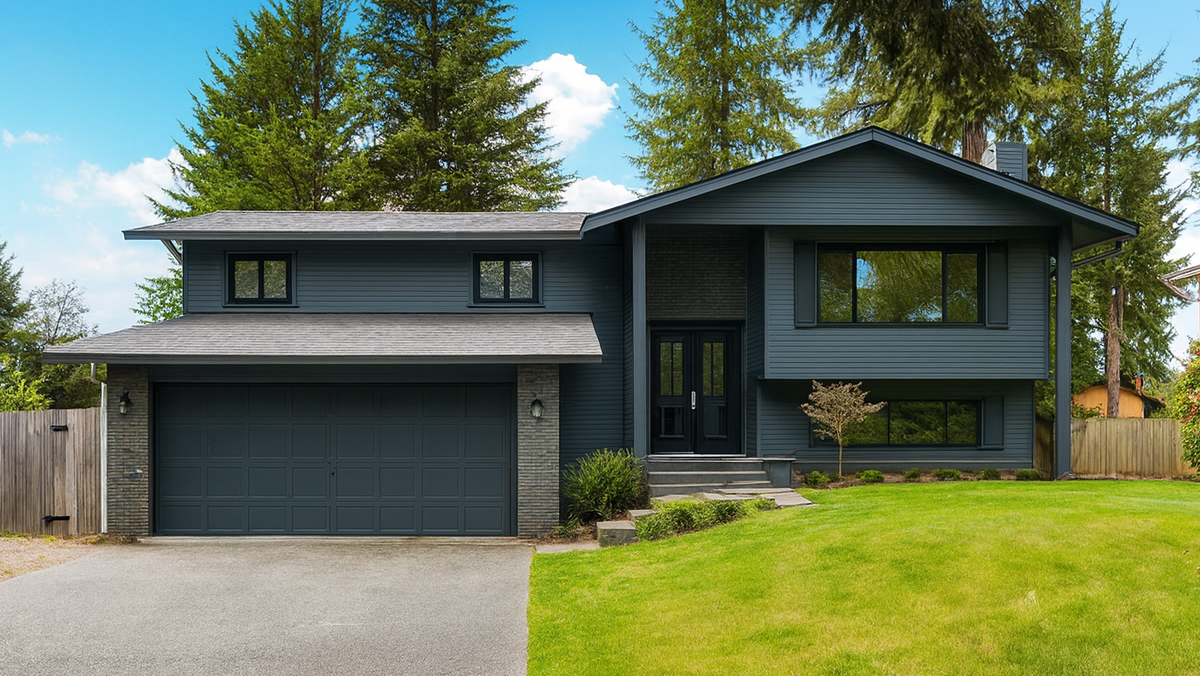Estimating construction costs is a fundamental step in any construction project. It is the backbone that ensures accurate planning, budgeting, and financial viability.
With Hover, delve into the importance of precise construction estimates, the optimal timing for cost estimation, various types of cost estimates, indispensable tools for estimating, a step-by-step guide to creating construction cost estimates, and how to transform your estimate into a compelling bid proposal.
The Importance of Accurate Construction Estimates
Accurate construction estimates are the foundation of successful project planning. They provide a realistic understanding of the costs involved, which allows project managers to make informed decisions. Whether you are a contractor, engineer, or developer, accurate estimates help you avoid financial surprises and ensure that your project is completed within budget.
Having accurate estimates also plays a crucial role in securing funding for your construction project. Investors, lenders, and stakeholders rely heavily on the estimated costs to evaluate the feasibility of a project. Assurance of accurate estimates can increase their confidence in your project, making it more likely for you to secure the necessary financial support.
Moreover, precise construction estimates contribute to the overall efficiency of a project. By having a clear understanding of the costs from the outset, project teams can allocate resources effectively, streamline the construction process, and minimize delays. This level of detailed planning not only saves time and money but also enhances the quality of the final deliverable.
Accurate estimates also foster better communication among project stakeholders. When all parties involved have a shared understanding of the projected costs, timelines, and scope of work, it creates a transparent environment where expectations are aligned. This transparency can lead to smoother collaborations, reduced conflicts, and ultimately, a more successful project outcome.
When is the Right Time to Estimate a Construction Job?
The timing of your construction cost estimate can greatly impact the accuracy of the final figures. Ideally, you should aim to estimate the construction costs as early as possible during the project planning phase. This allows you to identify potential cost-saving opportunities and make any necessary adjustments to the project scope or design before significant resources and time are invested.
However, estimating construction costs is an ongoing process that continues throughout the project lifecycle. As each phase of the project progresses, more detailed estimates can be created, taking into account the specific requirements, materials, and labor involved in that particular phase.
It is crucial to consider external factors that may influence the timing of your construction cost estimate. For example, economic conditions, market trends, and material availability can all impact the accuracy of your estimates. Conducting regular reviews and updates to your cost estimates can help mitigate risks associated with these external factors and ensure that your budget remains realistic and achievable.
Furthermore, collaborating with key stakeholders, such as architects, engineers, and subcontractors, early in the estimation process can provide valuable insights and expertise that can improve the accuracy of your estimates. By involving these experts from the beginning, you can leverage their knowledge to identify potential challenges and opportunities that may impact the overall cost of the project.
Types of Construction Estimates
There are several types of cost estimates used in construction projects. These estimates play a crucial role in the planning and execution of any construction project, helping stakeholders make informed decisions and manage resources effectively.
Preliminary Cost Estimate
One important type of cost estimate is the Preliminary Cost Estimate. This estimate is made early in the project, often based on limited information such as rough sketches or high-level project requirements. While this estimate provides a general idea of the project's overall cost, it is important to note that the accuracy of this estimate may vary as more detailed information becomes available.
Budget Estimate
Another essential type of cost estimate is the Budget Estimate. This estimate is created during the project planning phase to allocate funds and establish a budget for the project. It helps project managers and stakeholders set financial goals and ensure that the project stays within budget constraints. The Budget Estimate serves as a roadmap for financial planning and resource allocation throughout the project lifecycle.
Definitive Estimate
Additionally, the Definitive Estimate is a critical tool in the construction industry. This estimate is based on detailed and accurate information, such as finalized project plans, detailed specifications, and itemized cost breakdowns. The Definitive Estimate is typically used for bidding purposes or contract negotiations, providing contractors and clients with a precise understanding of the project's costs.
Change Order Estimate
Change Order Estimates are also an important aspect of cost estimation in construction projects. These estimates are generated when there are changes or amendments to the original project plan, scope, or design. Change Order Estimates help stakeholders assess the impact of changes on project costs and timelines, ensuring transparency and accountability throughout the project.
Each type of estimate serves a specific purpose and requires different levels of detail and accuracy. Understanding the purpose of each estimate will help you determine which type is most appropriate for your specific needs. By utilizing the right cost estimate at the right stage of your project, you can effectively manage costs, mitigate risks, and ensure the successful completion of your construction project.
Tools for Estimating Construction Costs
Estimating construction costs can be a complex task, but there are various tools available to simplify the process. These tools range from traditional manual methods to advanced software applications specifically designed for construction estimating.
When it comes to construction estimating, having the right tools at your disposal can make a world of difference. Let's take a closer look at some commonly used tools for estimating construction costs:
Construction Software & Online Tools
Specialized software and online tools such as Hover, Procore, and Bluebeam are becoming more common in the construction industry. These tools offer features like supplier integrations, project estimators, and customizable templates. With the ability to store and retrieve data, these software applications can significantly speed up the estimating process, allowing for more accurate and efficient cost estimates.
Construction Estimate Spreadsheets
Basic spreadsheet software like Microsoft Excel can also be used for construction cost estimation. Customized templates and formulas can be created to streamline the estimating process. While not as robust as dedicated construction estimating software, spreadsheets can still be a valuable tool, especially for smaller projects or when a quick estimate is needed.
Manual Construction Estimates
Traditional manual methods, such as using construction cost handbooks or relying on past project experience, can still be effective for simple estimates or in situations where software is not readily available. While these methods may require more time and effort, they can be a cost-effective solution for smaller projects or when a high level of accuracy is not required.
Choosing the right tools for estimating construction costs depends on factors such as project complexity, budget, and the level of detail required. It is important to select tools that align with your specific needs and capabilities.
Remember, the goal of construction cost estimating is to provide accurate and reliable estimates that will help you make informed decisions. By utilizing the right tools and staying up-to-date with industry best practices, you can streamline your estimating process and set yourself up for success in the construction industry.
8 Steps to Create Construction Cost Estimates
Creating accurate construction cost estimates involves a systematic approach. Here are 8 essential steps to follow:
- Define the Scope: Clearly define the project scope and objectives, including all aspects of the construction work.
- Takeoff Quantities: Quantify all materials, labor, and equipment required for the project. This involves reviewing architectural and engineering drawings and specifications.
- Research Material Costs: Gather current material prices from suppliers and distributors to ensure accurate cost calculations.
- Calculate Labor Costs: Determine the labor requirements and rates for each trade involved in the construction project.
- Factor in Subcontractor Quotes: If subcontractors will be involved in the project, obtain quotes from them and include their costs in the estimate.
- Account for Overhead and Indirect Costs: Consider overhead expenses such as equipment rentals, insurance, permits, and general administrative costs.
- Include Profit Margin: Add a suitable profit margin to cover your business expenses and ensure a reasonable return on investment.
- Review and Validate: Double-check all calculations, review the estimate for accuracy, and seek expert input if necessary.
Following these steps will help you create comprehensive and accurate construction cost estimates tailored to your specific project requirements.
Accurate construction cost estimates are crucial for the success of any building project. By following these steps diligently, you can ensure that your estimates are not only precise but also realistic. It's essential to pay attention to every detail, from the cost of raw materials to the hourly rates of skilled laborers.
Moreover, when factoring in subcontractor quotes, it's important to choose reputable and reliable partners. Building strong relationships with subcontractors can lead to smoother project execution and potentially lower costs in the long run. Additionally, considering overhead and indirect costs is vital for maintaining financial stability throughout the project duration.
Turning an Estimate Into a Bid Proposal
Once you have prepared your construction cost estimate, the next step is to turn it into a bid proposal. A bid proposal is a formal document submitted to potential clients, outlining your estimated costs, project plan, and other relevant details.
When creating a bid proposal, it is essential to ensure that your estimate is well-presented and communicates the value of your services. Include a detailed breakdown of the estimated costs, highlighting all the items and factors that contribute to the overall price.
In addition to the cost estimate, your bid proposal should also include information about your company's qualifications, experience, project timeline, payment terms, and any unique selling points that set you apart from competitors.
By effectively translating your estimate into a bid proposal, you increase your chances of winning construction contracts and securing new business opportunities.
Furthermore, it is crucial to tailor your bid proposal to the specific needs and preferences of the potential client. Conduct thorough research on the client and the project requirements to customize your proposal accordingly. Addressing the client's concerns and demonstrating a clear understanding of their vision can significantly enhance your proposal's appeal.
Another important aspect to consider when preparing a bid proposal is to showcase your team's expertise and capabilities. Highlight key team members, their relevant experience, and how their skills align with the project requirements. This not only instills confidence in the client but also emphasizes the collaborative approach your company brings to the table.
Estimating construction costs is a fundamental skill for anyone in the construction industry. Accurate estimates provide a solid foundation for project planning and contribute to the project's overall success. By understanding the importance of accurate estimates, knowing when to estimate a construction job, utilizing the right tools, following a systematic approach, and effectively turning your estimate into a bid proposal, you can improve the financial viability and profitability of your construction projects.




